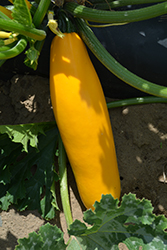Gold Rush Zucchini
Cucurbita pepo var. cylindrica 'Gold Rush'
Height: 18 inches
Spacing: 24 inches
Sunlight:
![]()
Hardiness Zone: (annual)
Description:
A fantastic compact variety that produces large, ample yields of 8" long, golden yellow fruit with a mild flavor and firm texture; exceptional when roasted, grilled or fresh in salads; zucchini blossoms can be stuffed and fried; harvest at any size
Edible Qualities
Gold Rush Zucchini is an annual vegetable plant that is commonly grown for its edible qualities. It produces gold long fruit with creamy white flesh which can be harvested at any point. The fruits have a delicious taste and a firm texture.
The fruit are most often used in the following ways:
- Eating When Cooked/Prepared
- Cooking
- Baking
- Freezing
Planting & Growing
Gold Rush Zucchini will grow to be about 18 inches tall at maturity, with a spread of 3 feet. When planted in rows, individual plants should be spaced approximately 24 inches apart. This vegetable plant is an annual, which means that it will grow for one season in your garden and then die after producing a crop.
This plant is typically grown in a designated vegetable garden. It should only be grown in full sunlight. It does best in average to evenly moist conditions, but will not tolerate standing water. It is not particular as to soil pH, but grows best in rich soils. It is somewhat tolerant of urban pollution. Consider applying a thick mulch around the root zone over the growing season to conserve soil moisture. This is a selected variety of a species not originally from North America.; however, as a cultivated variety, be aware that it may be subject to certain restrictions or prohibitions on propagation.
Gold Rush Zucchini is a good choice for the vegetable garden, but it is also well-suited for use in outdoor pots and containers. It is often used as a 'filler' in the 'spiller-thriller-filler' container combination, providing the canvas against which the larger thriller plants stand out. Note that when growing plants in outdoor containers and baskets, they may require more frequent waterings than they would in the yard or garden.


